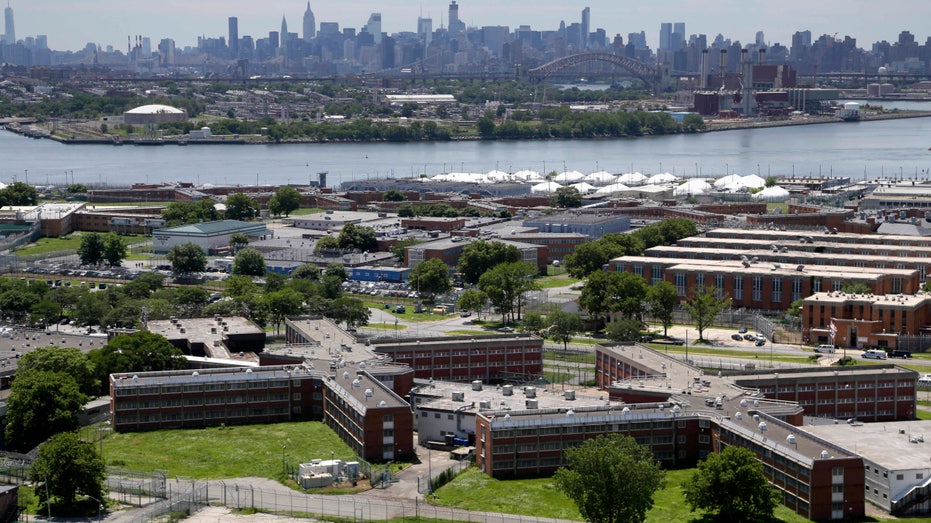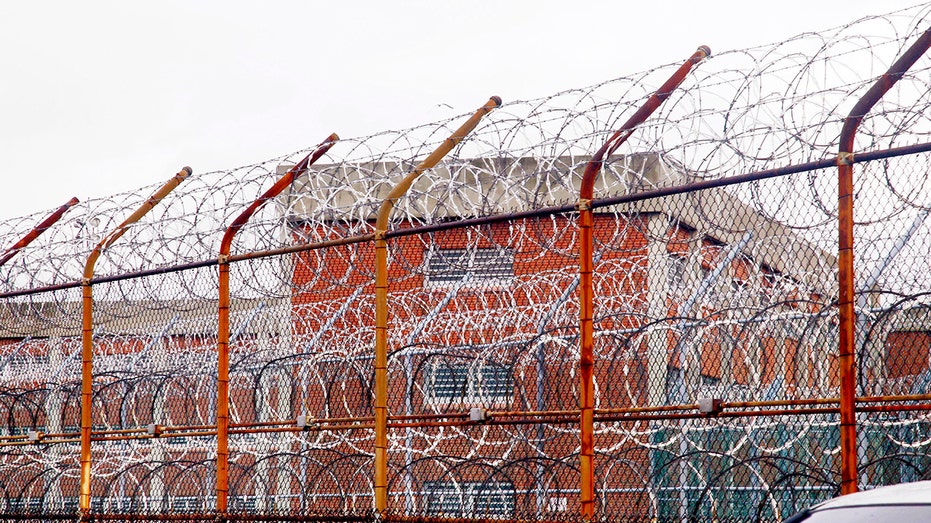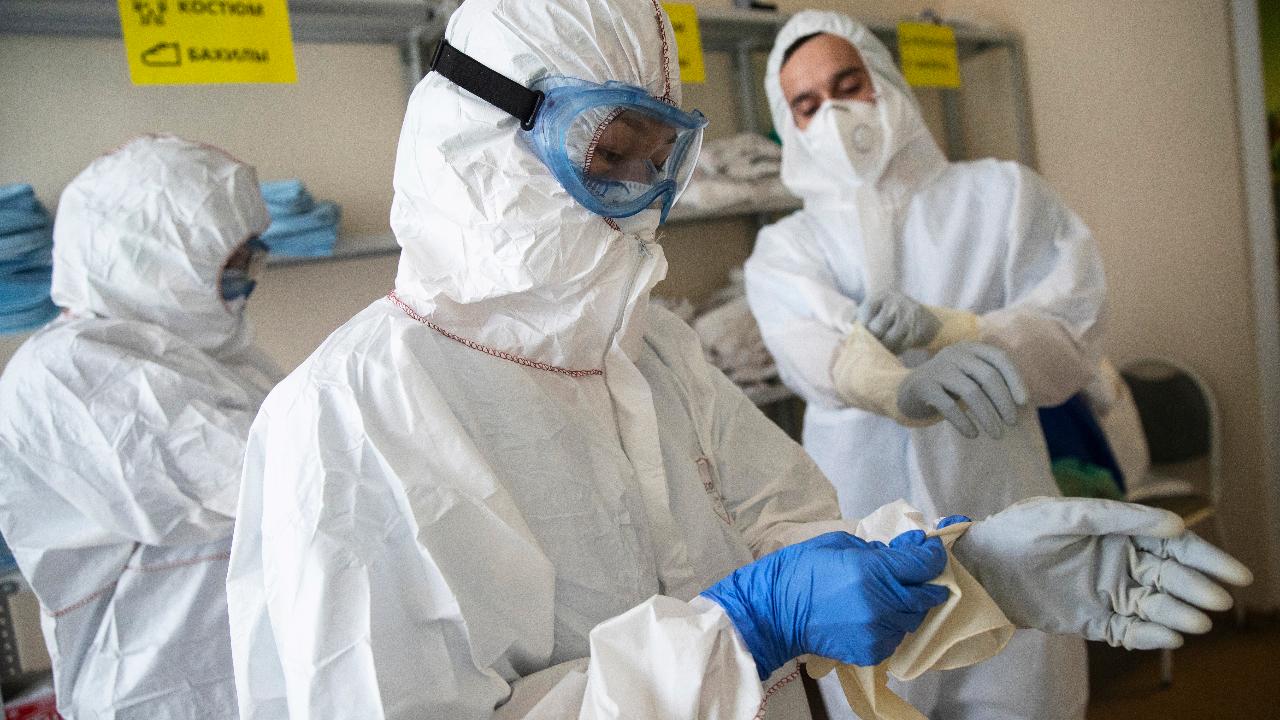Rikers Island jail guards are dying in one of the worst coronavirus outbreaks
The New York City correctional complex is among the most-infected workplaces in the US
Get all the latest news on coronavirus and more delivered daily to your inbox. Sign up here.
When Quinsey Simpson relieved a colleague at New York City’s Rikers Island jail complex in early March, he had no idea his fellow correction officer was infected with the coronavirus.
Before long, Officer Simpson had an unrelenting cough. When his chest began feeling tight, he went to the emergency room and was diagnosed with Covid-19, the disease caused by the virus. “We had the hope of him getting better, until he got on the respirator,” said Britton Alston, his friend and one-time co-worker.
On March 27, Officer Simpson, 62 years old, died.
CAN COMPANIES BE LIABLE FOR CORONAVIRUS WHEN EMPLOYEES RETURN TO WORK?
Officer Simpson was the first officer to die of Covid-19 complications during a rapidly spreading outbreak in New York City’s jail system, overwhelming its largest facility, Rikers Island. Covid-19 cases among Rikers employees are now on par with levels seen in the most infected American workplaces, such as the USS Roosevelt and a pork plant in South Dakota.
More than 800 city correction employees have tested positive as of Monday, city officials said, and eight have died. City officials wouldn’t break down how many infected officers work at Rikers, but the union says it accounts for 70% to 80% of the cases.
Including inmates, there have been 10 deaths and more than 1,200 confirmed cases in the city’s jails.
“It’s a devastating number, the most I’ve heard of at any one facility,” said David Michaels, former head of the Occupational Safety and Health Administration and professor at George Washington University’s School of Public Health. Mr. Michaels is tracking workplace cases and deaths caused by the coronavirus.
The virus transmissions that happened at Rikers Island have contributed to the toll that Covid-19 has taken on New York City, said Mr. Michaels, who launched Rikers Island’s first epidemiology unit in the early 1990s. The city leads the nation in confirmed cases, with more than 139,000, and 11,500 deaths, according to the state’s Department of Health.

Rikers Island jail complex in New York, photographed on June 20, 2014. (AP Photo/Seth Wenig, File)
“Correctional officers and others working on the island, as well as its prisoners, were no doubt exposed and then brought it home to their family and community,” Mr. Michaels said.
New York City’s jail system is the second largest in the nation, with Rikers Island housing more than 4,000 inmates in eight jails. The outbreak has stretched staffing and added a frightening new element of uncertainty to the already dangerous job of guarding inmates. Correction officers work closely with infected inmates and can’t do their jobs from home.
Correction officers and defense lawyers said city officials ignored warnings that Rikers would become a dangerous incubator for the coronavirus if measures weren’t taken to proactively combat the contagion.
Officers say the Department of Correction didn’t provide access to Covid-19 testing or protective gear, such as masks, face shields and gloves, until recently. Rikers employees said they weren’t immediately told if they were exposed to a co-worker who had tested positive, creating the risk they would silently and asymptomatically spread the virus.
The city waited too long to suspend visitation for inmates and open a separate unit to house new inmates, officers said. Few new rules were launched in March, when the virus was spreading, beyond cleaning housing units and advising inmates to keep a physical distance from each other, officers said.
“There were inexplicable delays and feet-dragging while a lot of our officers were getting really sick and died,” said Michael Skelly, spokesman for the Correction Officers’ Benevolent Association, the trade union representing 20,000 active and retired officers.
HUNDREDS OF AMAZON WORKERS PROTESTING CORONAVIRUS CONDITIONS TO SKIP WORK: WORKERS RIGHTS GROUP
In response to questions from The Wall Street Journal, the Department of Correction said there has been “a dedicated, coordinated and focused departmental response to this from the beginning.” The department said that it has held regular Covid-response meetings since early March and that it took extensive measures to prevent transmission—like sanitizing common areas daily and offering soap and cleaning supplies to inmates free of charge—and informs staffers within 48 hours if they were exposed to someone with a confirmed case.
The Department of Correction took additional steps in April to address officer concerns as city officials, including Mayor Bill de Blasio, began advising all New Yorkers to wear protective equipment outside and a lawsuit was filed by the officers’ union.
The city has set up Covid-19 testing sites for Rikers employees, said Peter Thorne, the city’s chief correction spokesman.
On Saturday, the Department of Correction chief Hazel Jennings sent a memo—reviewed by the Journal—to all commanding officers, ordering that all employees get “an adequate amount of personal protective equipment.”

In this March 16, 2011, file photo, a security fence surrounds inmate housing on the Rikers Island correctional facility in New York. (AP Photo/Bebeto Matthews, File)
Officers transporting positive or symptomatic inmates, or who are assigned to their housing units, must also be given N95 and face shields, the order said. The order further required a current list of housing units with positive or symptomatic inmates be posted at all times.
“Do your damn job,” Elias Husamudeen, president of the union, said of the Department of Correction and its top officials. “Protect correctional officers, protect the inmates.”
Officer Simpson, an 18-year veteran, typically worked intake at Rikers, one of the busiest divisions, interacting with any newly arrested inmates or those coming or going from the facility.
Both his friend Mr. Alston and a representative for the union said Officer Simpson was healthy until he took a temporary assignment working in a jail security booth a few weeks before his death. According to the union, Officer Simpson relieved an officer who later became the first worker to test positive for Covid-19.
The booth was disinfected before Officer Simpson’s shift, Mr. Thorne said. Union officials said Officer Simpson wasn’t given a mask or gloves. At the time, the jail was following guidance from city health officials, which only ensured protective gear to “medical professionals treating severely ill patients in hospitals,” said Michael Lanza, assistant press secretary for the city’s Department of Health and Mental Hygiene, citing a citywide shortage of PPE.
Correction officers at Rikers said they have become fearful of contracting the virus since Officer Simpson’s death. He left behind elderly parents, two siblings and a 6-year-old son.
GET FOX BUSINESS ON THE GO BY CLICKING HERE
Officers say they have been forced to work up to 24-hour shifts, overseeing exposed inmates inside quarantined housing areas without masks or gloves.
A 30-year-old officer, assigned to a unit that houses inmates with acute medical conditions and disabilities, said the Department of Correction pressured him to go back to work after he tested positive on March 29. He said he was still symptomatic and his four-person household, including his 60-year-old parents, girlfriend and 5-year-old son, had begun coming down with fever and sore throats too.
The officer said a Department of Correction physician told him he might lose pay if he missed additional time, even with a doctor’s note advising self-quarantine. He didn’t go back to work.
Mr. Thorne said that “no one is being forced to work if they are sick.” The department gives officers unlimited paid sick time and follows federal guidelines for allowing workers to return to work, he said.
Public-health experts said the correction officer infection rate is due in part to the nature of jails and their constant churn of people coming and going. Inside Rikers, inmates are in close physical proximity and may be held in small, confined spaces, said Robert Cohen, the complex’s former medical director and a member of the city’s Board of Correction, an independent agency with oversight of Rikers.
Sometimes dorms hold 50 people, sleeping in beds bolted to the floor, less than 6 feet apart. Even basic behavior like hand-washing can be difficult in jail, where items like hand sanitizer are deemed contraband due to its high alcohol content.
“They were built to punish,” Dr. Cohen said, and for efficiently “packing people into space.”
CLICK HERE TO READ MORE ON FOX BUSINESS
City officials have worked with judges and prosecutors to release 1,400 prisoners from Rikers, a trend seen across the country designed to make social distancing easier inside facilities. There have been deadly outbreaks at several federal, state and local detention centers.
“The correction and the medical staff are heroes for what they’re doing,” Dr. Cohen said.




















